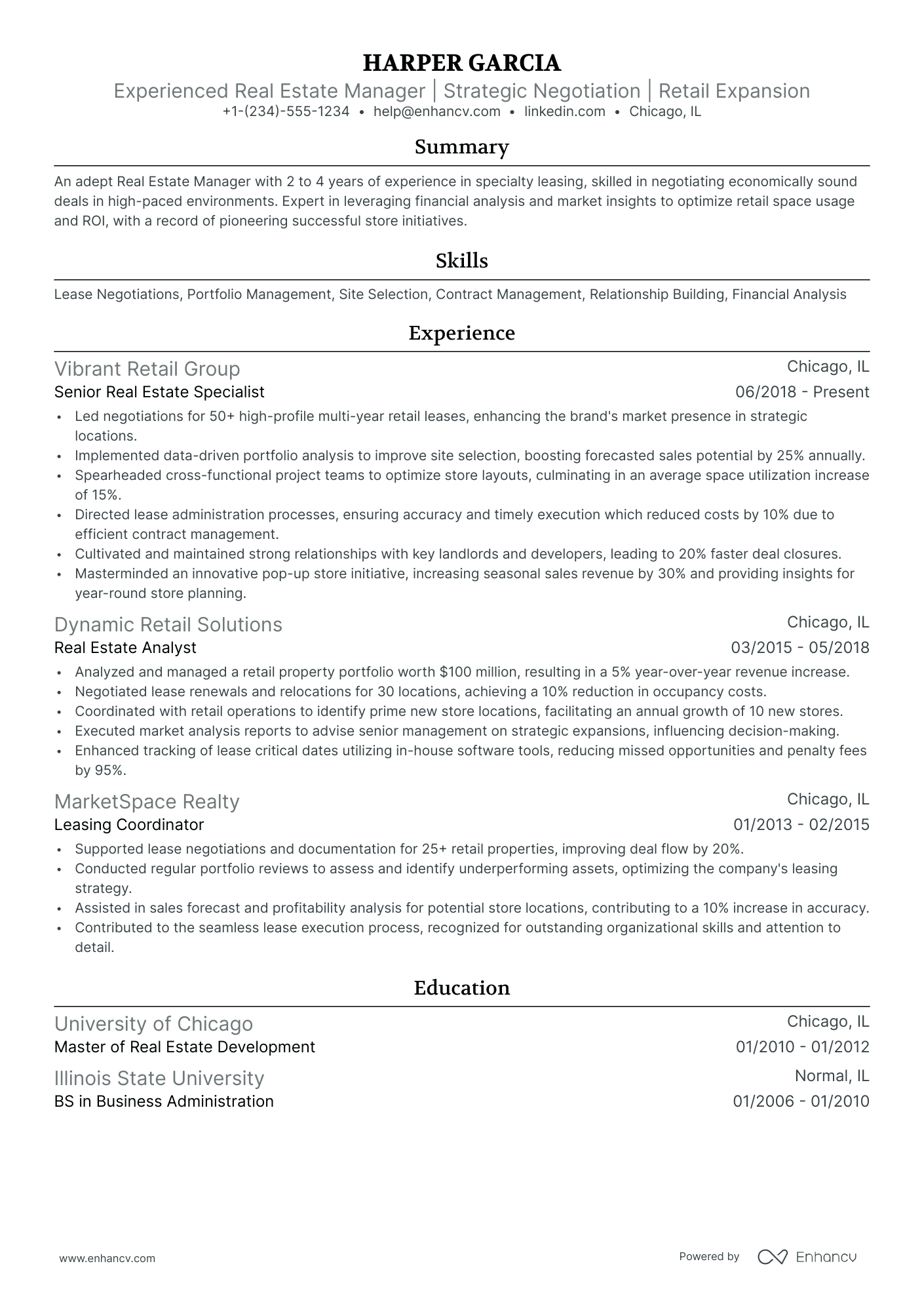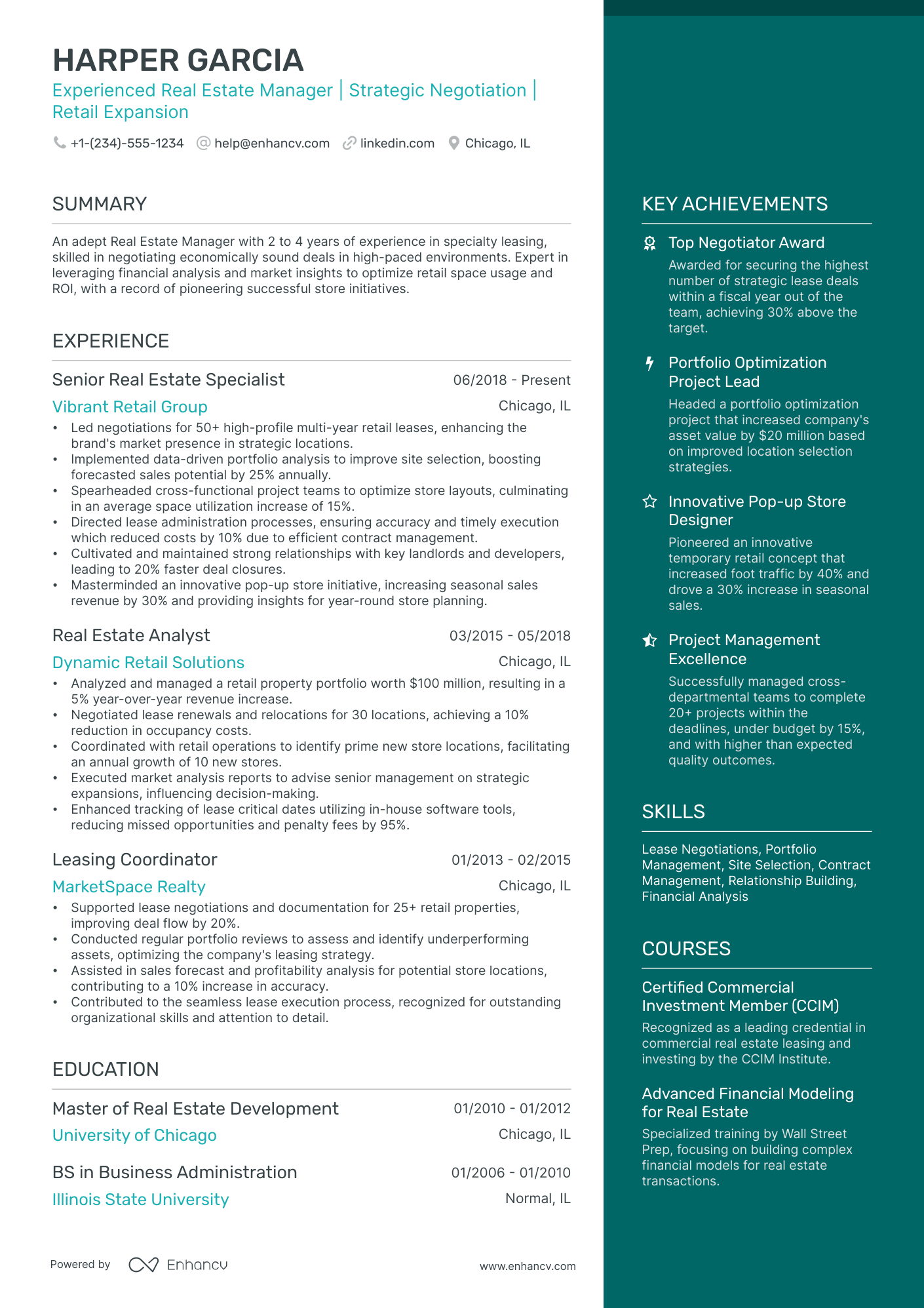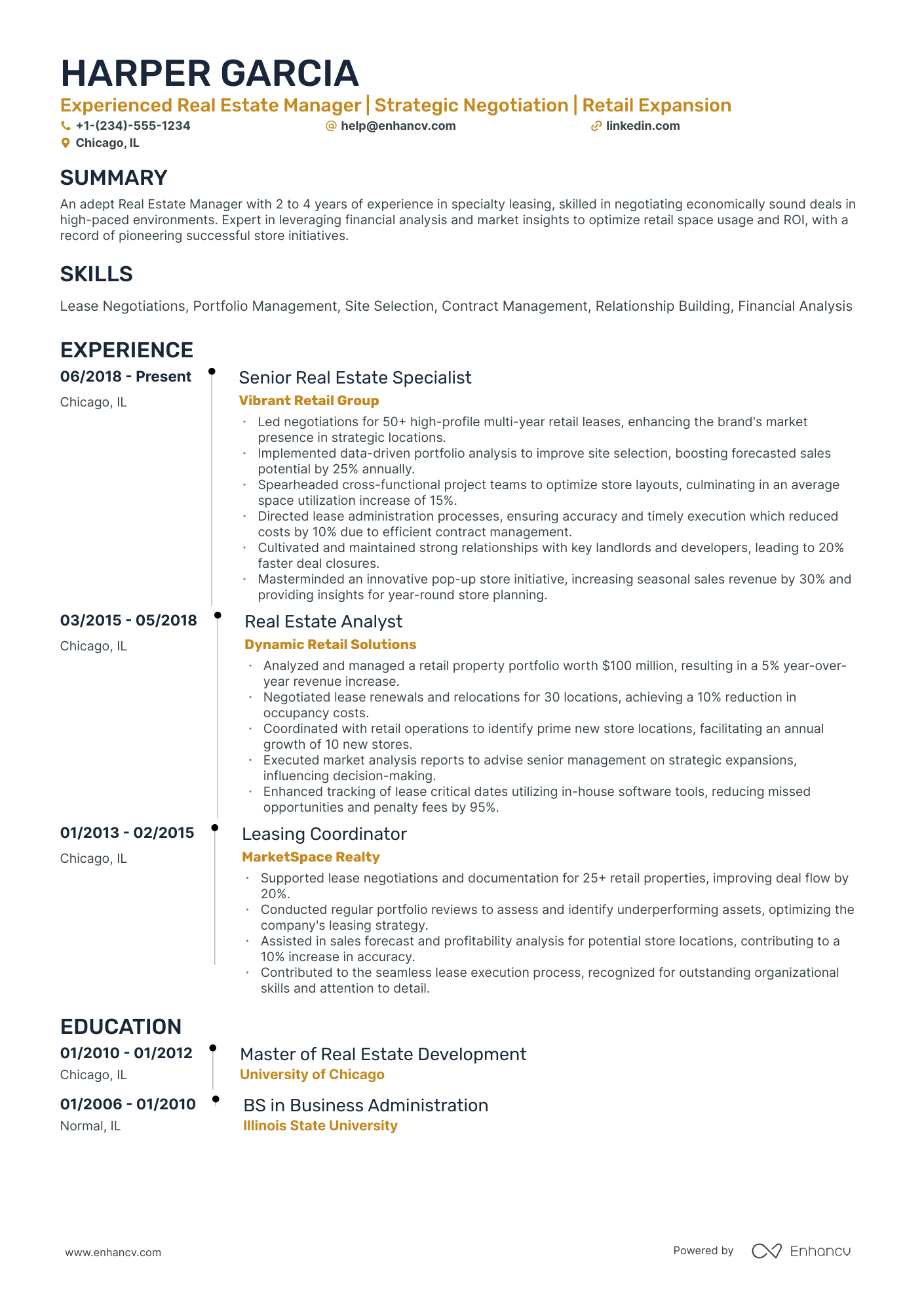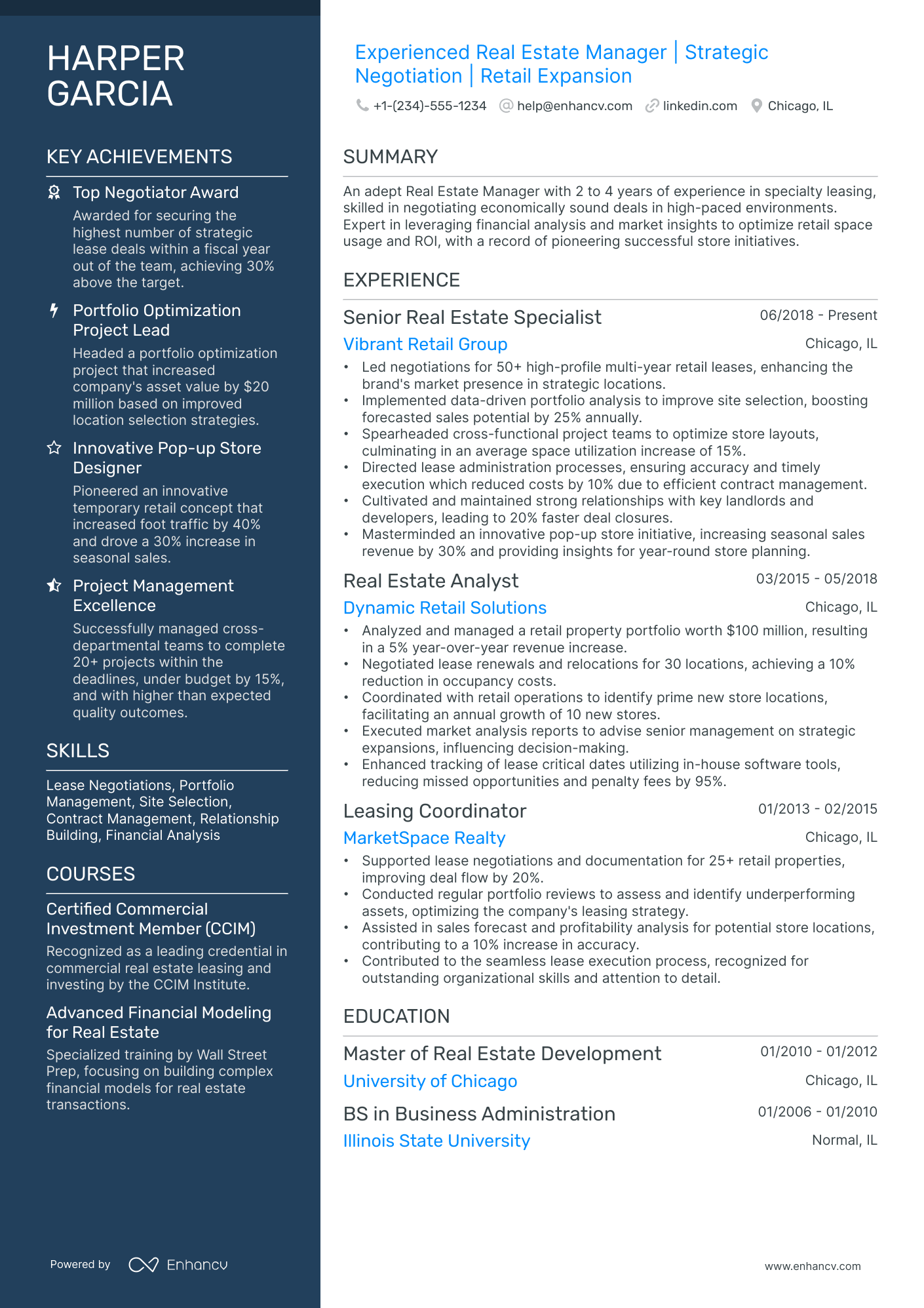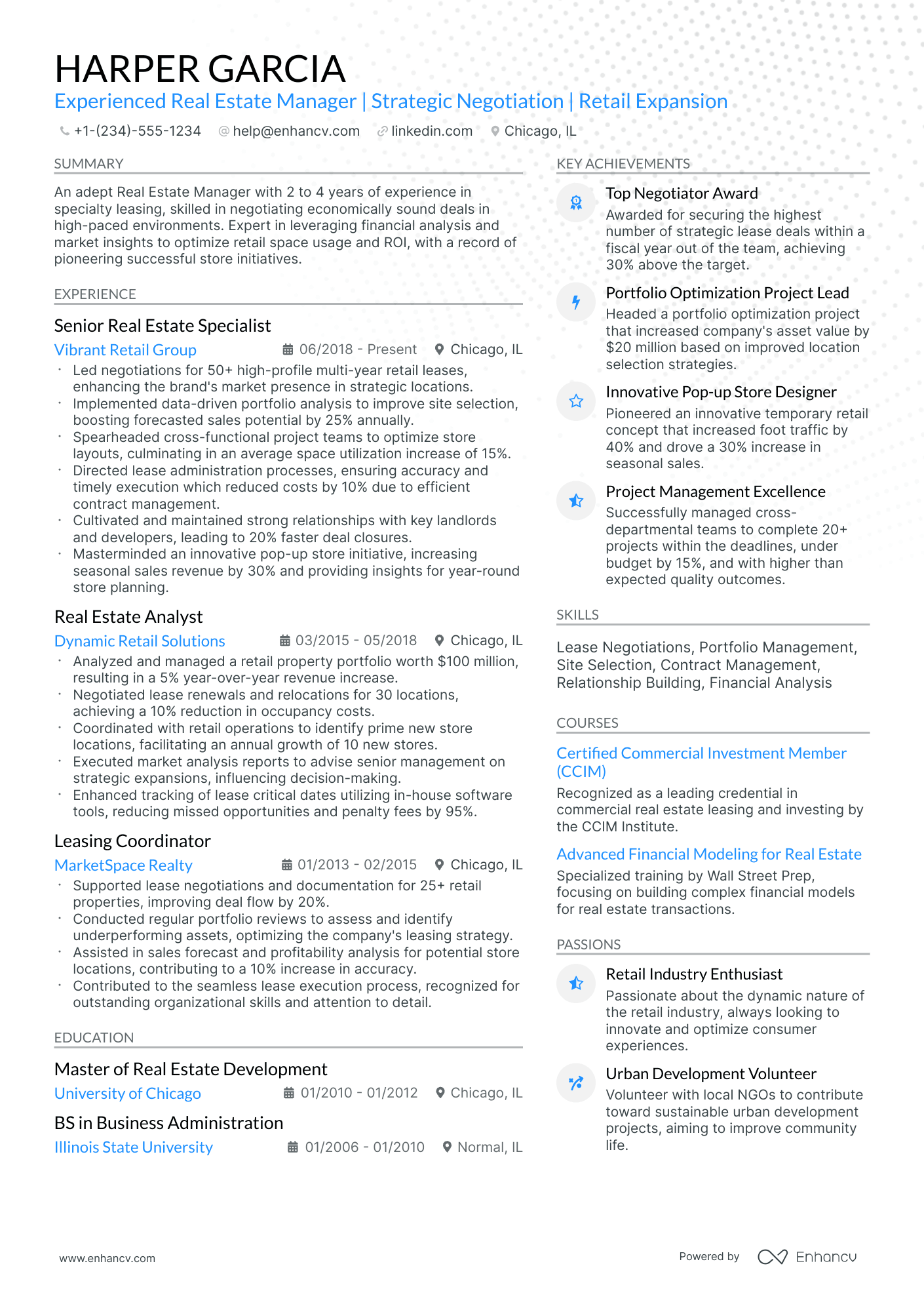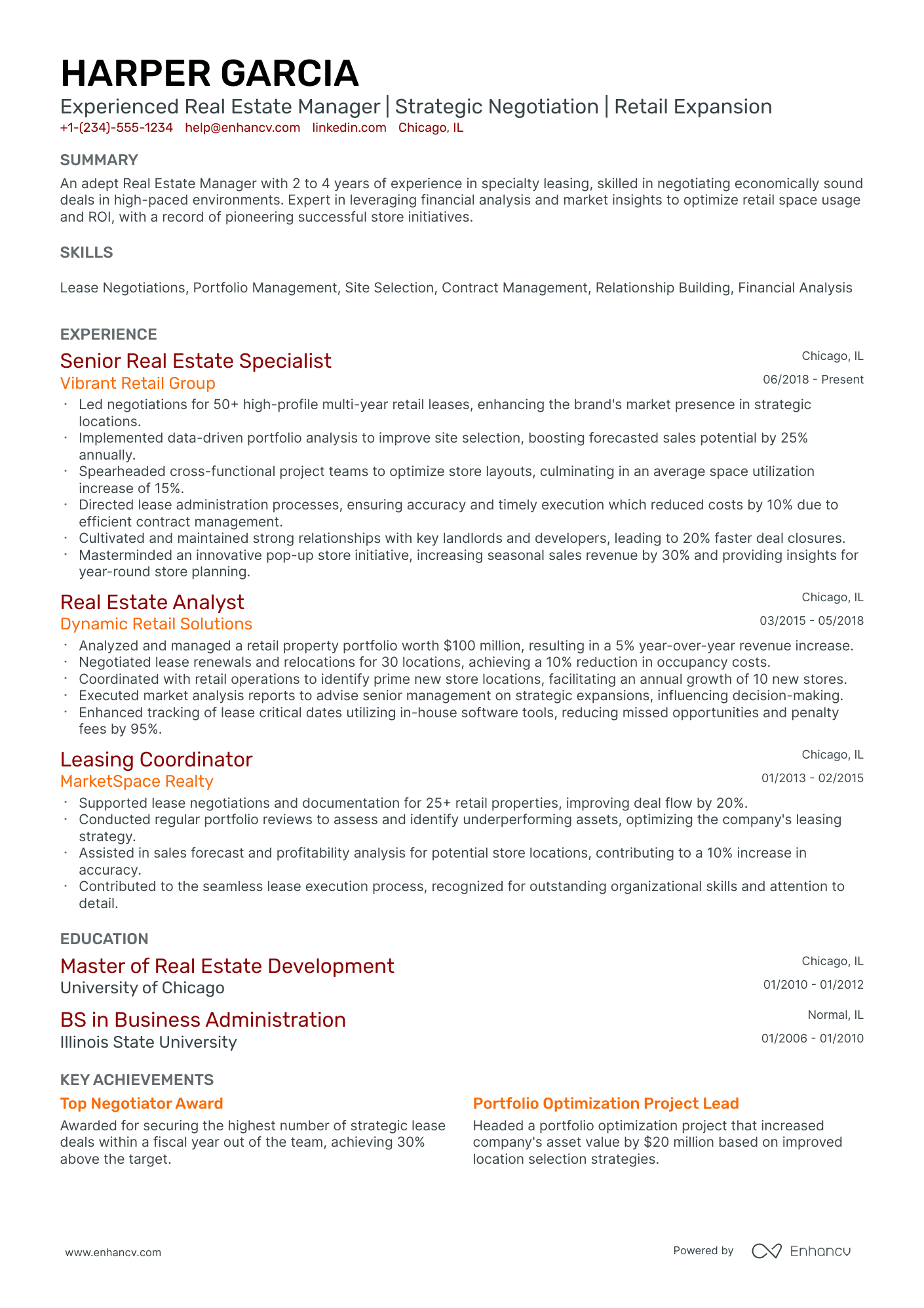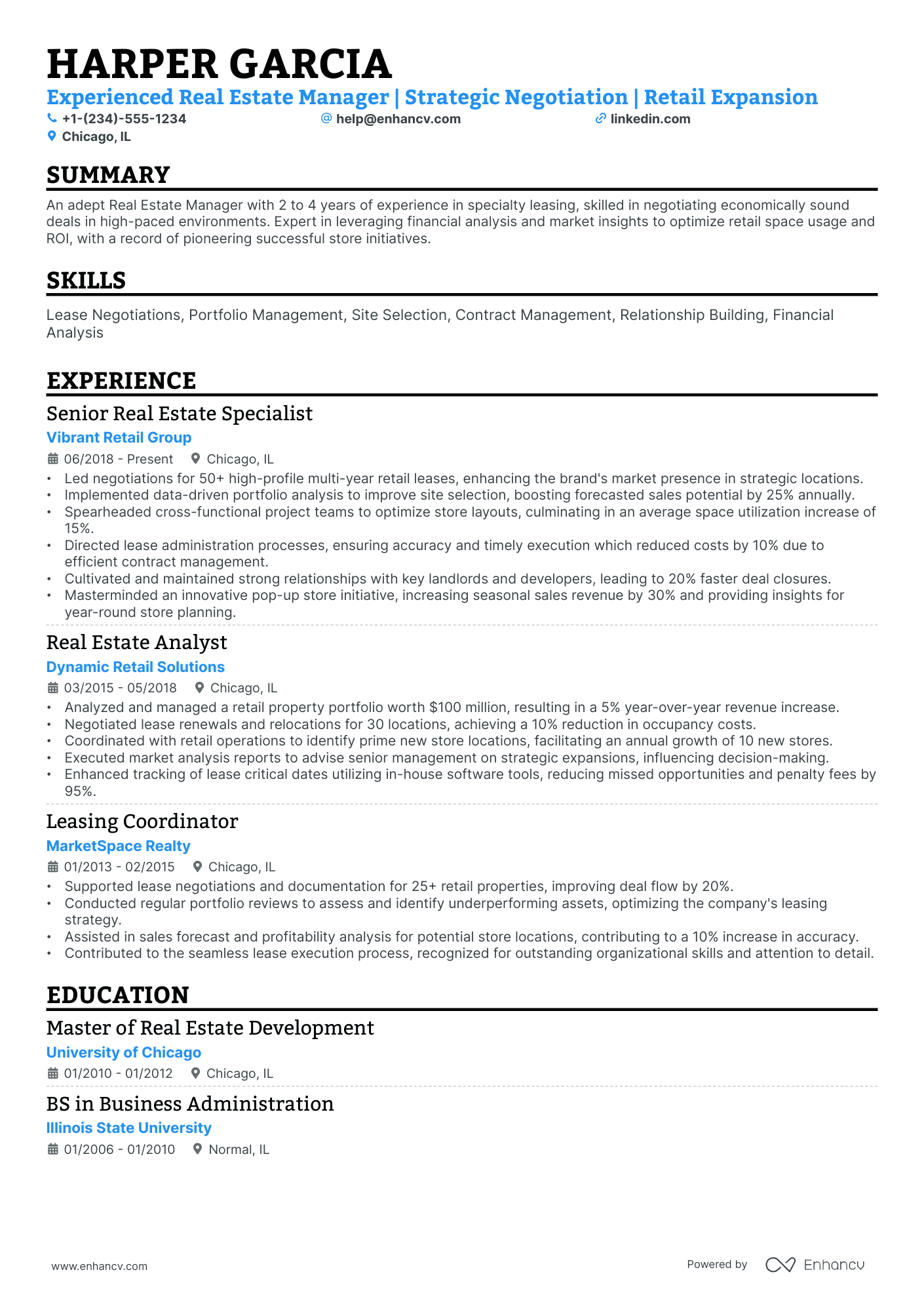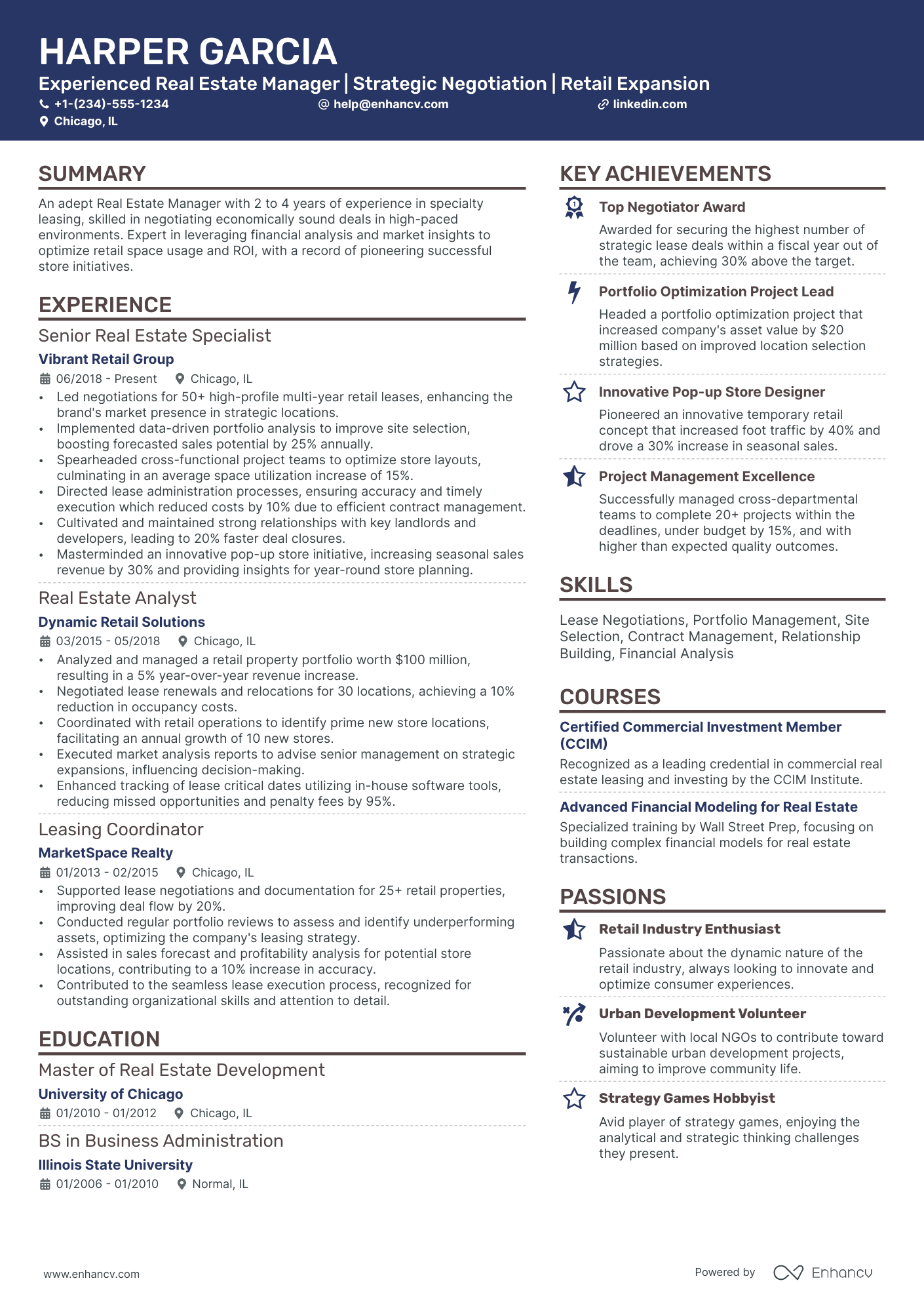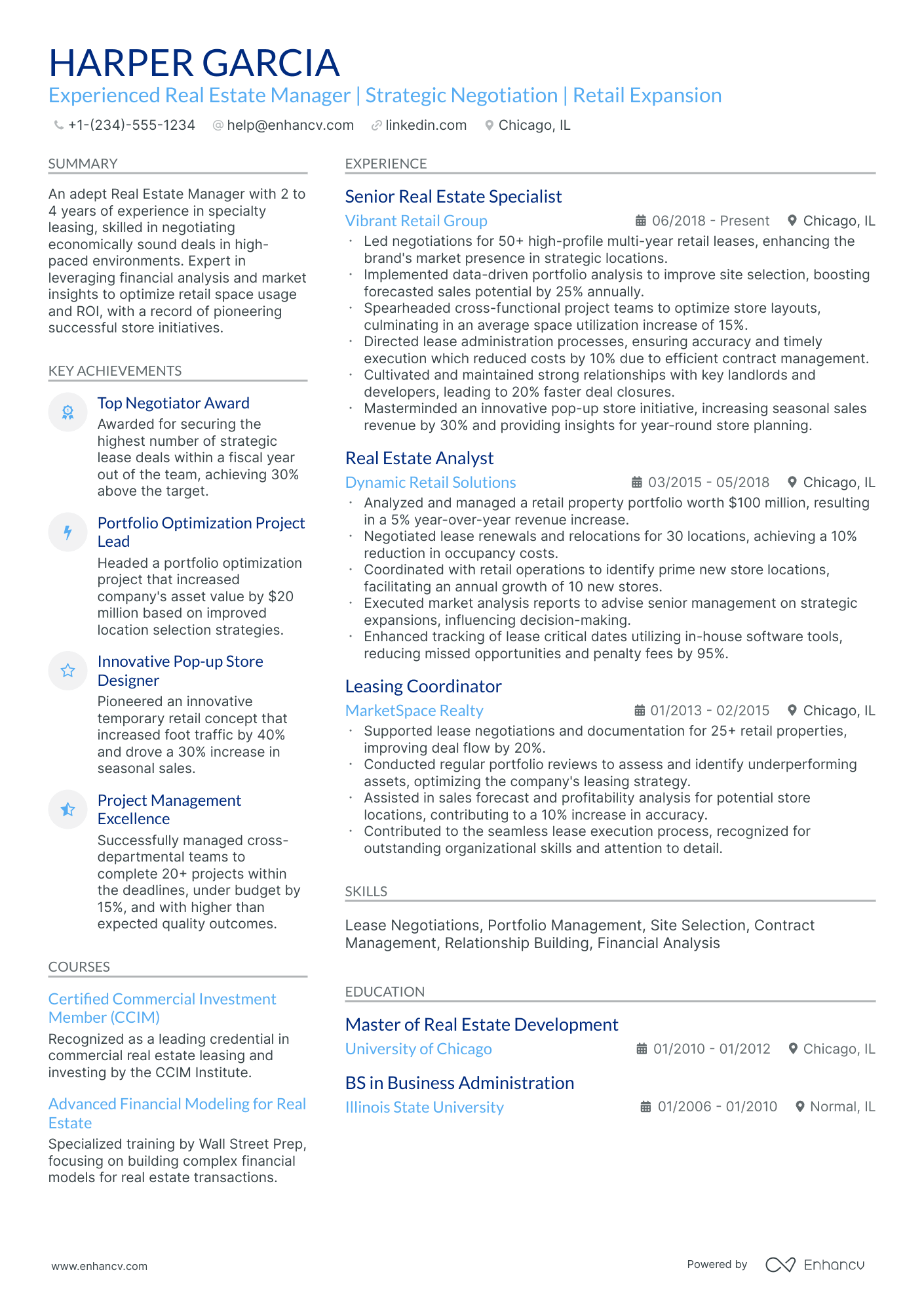As a real estate manager, you may struggle with articulating your diverse experience in property management, sales, and customer service succinctly on your resume. Our guide will provide you with clear examples and strategies to highlight your multifaceted skill set effectively, ensuring that your resume stands apart in the competitive real estate industry.
- The most effective real estate manager resume samples, reflecting on experience and skills.
- +10 simple, yet impactful methods to tailor your real estate manager resume to the job advert.
- Using your professional achievements as the North Star to your unique value as a real estate manager candidate.
- 'No one cares about your education nowadays …' Let's prove this statement wrong with the best-kept industry secrets to your education and certifications.
If the real estate manager resume isn't the right one for you, take a look at other related guides we have:
- House Manager Resume Example
- Estate Agent Resume Example
- Real Estate Appraiser Resume Example
- Broker Resume Example
- Real Estate Developer Resume Example
- Real Estate Professional Resume Example
- Real Estate Intern Resume Example
- Facility Manager Resume Example
- Realtor Resume Example
- Real Estate Salesperson Resume Example
Creating the best real estate manager resume format: four simple steps
The most appropriate real estate manager resume format is defined by precision and a systematic approach. What is more, it should reflect upon how your application will be assessed by recruiters. That is why we've gathered four of the most vital elements to keep in mind when designing your resume:
- It's all about presenting how your experience or skills align with the job. Use the reverse-chronological resume format , if your expertise is relevant to the real estate manager role. Otherwise, select the functional skill-based resume format or the hybrid resume format to shift the focus to your skill set.
- Resume header - make sure you've filled out all relevant (and correct) information, like your contact details and link to your portfolio.
- Resume length - unless you've over a decade of applicable expertise in the field, stick with a one-page resume format. If you'd like to present more of your professional experience, go up to two pages.
- Resume file - submit your real estate manager resume in a PDF format to ensure all information stays in the same place.
Adjust your resume layout based on the market – Canadian resumes, for example, may follow a unique format.
Upload & Check Your Resume
Drop your resume here or choose a file. PDF & DOCX only. Max 2MB file size.
PRO TIP
Showcase any ongoing or recent educational efforts to stay updated in your field.
Essential sections that should make up your real estate manager resume include:
- The header - with your contact details (e.g. email and telephone number), link to your portfolio, and headline
- The summary (or objective) - to spotlight the peaks of your professional career, so far
- The experience section - with up to six bullets per role to detail specific outcomes
- The skills list - to provide a healthy mix between your personal and professional talents
- The education and certification - showing your most relevant degrees and certificates to the real estate manager role
What recruiters want to see on your resume:
- Proven experience in property management and a strong understanding of real estate markets and trends.
- Excellent organizational and project management skills, demonstrating successful management of multiple properties or large portfolios.
- Demonstrable track record of successful tenant relations, lease negotiations, and vacancy minimization.
- Financial acumen, including budgeting, financial reporting, and investment analysis specific to real estate assets.
- Understanding of local property law, zoning regulations, and property maintenance requirements.
Quick guide to your real estate manager resume experience section
After deciding on the format of your resume, it's time to organize your experience within the dedicated section.
It's common for real estate manager professionals to be confused in this part of the process, as they may have too much or little expertise.
Follow the general rules of thumb to be successful when writing this part of your resume:
- The perfect number of bullets you should have under each experience item is no more than six;
- Select not merely your responsibilities, but the most noteworthy achievements for each role that match the job requirements;
- List any certificates or technical expertise you've gained on the job and how they've helped you progress as a professional;
- Carefully select the power verbs to go along with each bullet to avoid generic ones like "managed" and instead substitute those with the actuality of your particular responsibility;
- Integrate valuable keywords from the job advert in the form of achievements under each role you list.
If you're on the search for further advice on how to write your real estate manager experience section, get some ideas from real-world professional resumes:
- Implemented strategic asset management plans for a portfolio of 25 commercial properties, resulting in a 15% increase in annual rental revenue.
- Negotiated and closed over 50 lease agreements with national and local tenants, improving portfolio occupancy rates from 88% to 96% within 18 months.
- Led the due diligence process for the acquisition of a $30 million mixed-use development project, enhancing the company’s market presence in the region.
- Oversaw operational aspects of a 3 million square foot commercial real estate portfolio, streamlining operations and reducing operating expenses by 20%.
- Implemented energy-efficient upgrades across properties that cut energy costs by $200,000 annually and increased property values by an estimated 10%.
- Coordinated with property managers to improve tenant satisfaction scores by 25% through targeted service improvements and timely responses to issues.
- Played a pivotal role in the execution of a real estate investment strategy that generated a portfolio return of 12% per annum.
- Managed relationships with investors and stakeholders, securing an additional $10 million in investment capital for emerging market opportunities.
- Assisted in the management of a diversified property portfolio, including residential, commercial, and industrial assets, contributing to a 30% growth in asset valuation over three years.
- Optimized the performance of a $500 million real estate portfolio, achieving a 98% occupancy rate through proactive lease management and tenant retention strategies.
- Conducted market and financial analysis to inform property acquisition decisions, leading to the successful addition of 5 high-potential properties to the portfolio.
- Collaborated with cross-functional teams to develop and execute a $20 million capital improvement program that increased property value and tenant appeal.
- Lead multidisciplinary project teams on the completion of a high-end residential development project, valued at $85 million, on time and within budget.
- Spearheaded negotiations with local government officials for zoning approvals, resulting in the successful entitlement of over 100,000 square feet of commercial space.
- Collaborated closely with construction teams, architects, and engineers to design and construct sustainable building features that won the project the LEED Silver certification.
- Successfully acquired and integrated a portfolio of 10 industrial properties with a combined value of $200 million, expanding the company's footprint into 2 new markets.
- Conducted comprehensive financial modeling and risk assessment for potential acquisitions, contributing to a 95% success rate on projected investment returns.
- Facilitated cross-departmental collaboration to ensure seamless transition and management of acquired assets, maintaining over 99% tenant retention within the first year.
- Managed a real estate portfolio across the Southeast region with over 1.5 million square feet of commercial space, increasing net operating income by 18%.
- Devised and executed capital budgeting strategies for portfolio enhancement projects with a combined budget of $15 million, leading to a measurable improvement in property standards.
- Coordinated with brokers, tenants, and contractors to facilitate timely and cost-effective space build-outs for new tenants, effectively reducing vacancy rates by 10%.
- Scaled residential property portfolio by 20%, acquiring and integrating 400 new units while maintaining an average occupancy rate of 95%.
- Developed a technology-driven approach to property management, utilizing a suite of software tools to streamline operations and enhance tenant communication and services.
- Orchestrated a portfolio-wide refurbishment plan including smart home technology installations, directly leading to a 10% premium on rental pricing due to increased demand.
The following content includes information from "O*NET OnLine" by the U.S. Department of Labor, Employment and Training Administration (USDOL/ETA). Used under the CC BY 4.0 license. The data represents the top responsibilities present on the task lists for real estate manager professionals.
Top Responsibilities for Real Estate Manager:
- Prepare detailed budgets and financial reports for properties.
- Manage and oversee operations, maintenance, administration, and improvement of commercial, industrial, or residential properties.
- Plan, schedule, and coordinate general maintenance, major repairs, and remodeling or construction projects for commercial or residential properties.
- Direct collection of monthly assessments, rental fees, and deposits and payment of insurance premiums, mortgage, taxes, and incurred operating expenses.
- Meet with clients to negotiate management and service contracts, determine priorities, and discuss the financial and operational status of properties.
- Direct and coordinate the activities of staff and contract personnel and evaluate their performance.
- Prepare and administer contracts for provision of property services, such as cleaning, maintenance, and security services.
- Market vacant space to prospective tenants through leasing agents, advertising, or other methods.
- Act as liaisons between on-site managers or tenants and owners.
- Investigate complaints, disturbances, and violations and resolve problems, following management rules and regulations.
Quantifying impact on your resume
- Include the total value of properties managed, demonstrating the scale of your responsibility and financial acumen.
- State the percentage increase in property values under your management, showcasing your ability to enhance asset worth.
- List the number of properties in your portfolio to highlight your capability in handling multiple projects.
- Mention the number of leasing contracts you have negotiated to reflect your negotiation skills and success in deal-making.
- Quantify the reduction in operational costs achieved through your initiatives, indicating your efficiency and cost-saving abilities.
- Specify the percentage of occupancy rates you have maintained or improved, showing your effectiveness in property marketing and tenant retention.
- Report the number of renovation or capital improvement projects overseen, proving your project management skills and ability to enhance property value.
- Detail the amount of revenue generated through ancillary services, such as parking and vending, to demonstrate your innovative approach to income diversification.
Action verbs for your real estate manager resume
What if my real estate manager experience doesn't match the requirements?
You've just graduated from college and may have no real world job experience . What should you include within your resume then?
Instead of making up information or adding irrelevant past jobs (e.g. your on-campus work during freshman year), you can:
- Shift the focus from your professional experience to your community impact with your volunteer work. This would showcase numerous soft skills you've built over time (e.g. interpersonal communication);
- Highlight the projects you've completed, as part of your coursework, or, on your own. Thus, you will align your technical background with recruiters' requirements;
- Consider spotlighting your transferrable skills. Or, what lessons and talents your current professional and personal experience has taught you and how they could benefit your potential employers;
- Even if you've had a few months of internship experience, that is relevant for the role, make sure to include this. Recruiters do care about the years of experience you happen to have, but, at the end of the day, your profile would also be assessed based on role alignment.
Recommended reads:
PRO TIP
If you happen to have plenty of certificates, select the ones that are most applicable and sought-after across the industry. Organize them by relevance to the role you're applying for.
In-demand hard skills and soft skills for your real estate manager resume
A vital element for any real estate manager resume is the presentation of your skill set.
Recruiters always take the time to assess your:
- Technological proficiency or hard skills - which software and technologies can you use and at what level?
- People/personal or soft skills - how apt are you at communicating your ideas across effectively? Are you resilient to change?
The ideal candidate presents the perfect balance of hard skills and soft skills all through the resume, but more particular within a dedicated skills section.
Building your real estate manager skills section, you should:
- List up to six skills that answer the requirements and are unique to your expertise.
- Include a soft skill (or two) that defines you as a person and professional - perhaps looking back on feedback you've received from previous managers, etc.
- Create up to two skills sections that are organized based on the types of skills you list (e.g. "technical skills", "soft skills", "real estate manager skills", etc.).
- If you happen to have technical certifications that are vital to the industry and really impressive, include their names within your skills section.
At times, it really is frustrating to think back on all the skills you possess and discover the best way to communicate them across.
We understand this challenge - that's why we've prepared two lists (of hard skills and soft skills) to help you build your next resume, quicker and more efficiently:
Top skills for your real estate manager resume:
Property Management Software
Real Estate Investment Analysis
Market Research Tools
Financial Modeling Software
Lease Management Systems
Geographic Information Systems (GIS)
Building Information Modeling (BIM)
Customer Relationship Management (CRM) Systems
Real Estate Marketing Platforms
Contract Management Software
Negotiation
Communication
Problem-Solving
Leadership
Time Management
Analytical Thinking
Customer Service
Attention to Detail
Adaptability
Team Collaboration
Next, you will find information on the top technologies for real estate manager professonals from "O*NET OnLine" by the U.S. Department of Labor, Employment and Training Administration (USDOL/ETA). Used under the CC BY 4.0 license.
Top technologies for Real Estate Manager’s resume:
- Propertyware
- Yardi software
- Google Docs
- Microsoft Word
- Intuit QuickBooks
- Sage 50 Accounting
PRO TIP
Always remember that your real estate manager certifications can be quantified across different resume sections, like your experience, summary, or objective. For example, you could include concise details within the expertise bullets of how the specific certificate has improved your on-the-job performance.
The basics of your real estate manager resume certifications and education sections
Improve the education and certification sections of your real estate manager resume by:
- Dedicating more prominent space to certificates that are more recent and have helped you update your skill set
- Keeping all the information you list to the basics: certificate/degree name, institution, and graduation dates
- Writing supplementary information in the details of your certification or education section, only if you lack experience or want to show further skill alignment
- Including your credential or license number, only if the information is valid to your application or certification
Within real estate manager job adverts, relevant education, and certification are always listed within the key prerequisite for the role.
Ensure you meet all job requirements with some of the leading certificates in the industry:
The top 5 certifications for your real estate manager resume:
- Certified Property Manager (CPM) - Institute of Real Estate Management (IREM)
- Real Property Administrator (RPA) - Building Owners and Managers Institute (BOMI) International
- Accredited Residential Manager (ARM) - Institute of Real Estate Management (IREM)
- Certified Commercial Investment Member (CCIM) - CCIM Institute
- Accredited Management Organization (AMO) - Institute of Real Estate Management (IREM)
The content below includes information from "O*NET OnLine" by the U.S. Department of Labor, Employment and Training Administration (USDOL/ETA). Used under the CC BY 4.0 license. The data represents the top associations for real estate manager professionals.
Top US associations for a Real Estate Manager professional
- Building Owners and Managers Association International
- Building Owners and Managers Institute
- CCIM Institute
- Community Associations Institute
- Institute of Real Estate Management
PRO TIP
If you failed to obtain one of the certificates, as listed in the requirements, but decide to include it on your resume, make sure to include a note somewhere that you have the "relevant training, but are planning to re-take the exams". Support this statement with the actual date you're planning to be re-examined. Always be honest on your resume.
Recommended reads:
Your real estate manager resume top one third: choosing between a resume summary or an objective
The top third of your resume is crucial, as recruiters might focus only on this section rather than reading the entire document. Therefore, it's important to carefully decide whether to include a resume summary or an objective.
- The resume summary encapsulates your most significant experiences, key achievements, and skills in the field. Ideal for candidates with substantial relevant experience, the summary previews what recruiters will find in the rest of your resume.
- The resume objective outlines your professional aspirations. It describes your career goals for the coming years and how you envision your role evolving in the prospective company. The resume objective is suitable if you have less professional experience and wish to emphasize various soft skills such as motivation, vision, and planning.
Explore some of the best examples of resume summaries and objectives from real-life professional resumes in the industry.
Resume summaries for a real estate manager job
- With over 10 years of experience managing high-value commercial real estate portfolios, my expertise in market analysis, property valuation, and lease negotiations has significantly increased revenue by 30% for the last firm. Proficient in Yardi and ARGUS software, I spearheaded the acquisition of a landmark mixed-use development project.
- Accomplished professional with 15 years in hospitality management transitioning to real estate management, bringing a track record of increasing guest satisfaction scores by 20%. Skilled in team leadership and operations, eager to apply my strong negotiation and budget management abilities to enhance property performance and tenant relations.
- Recent MBA graduate with in-depth knowledge of financial modeling and strategic planning developed through academic coursework, now seeking to leverage my analytical skills in real estate management. Eager to apply my intern experience in market research and investment analysis to optimize asset portfolios and drive sustainable growth.
- Former software project manager with 8 years of experience leading cross-functional teams, now pivoting to real estate management fueled by a passion for real estate investment and development. My strong project management skills and proficiency in Agile methodologies will contribute to efficient property operations and maintenance.
- Aspirational estate manager with a fresh perspective and a Bachelor's in Business Administration, ready to immerse myself in property management. Committed to pursuing excellence in tenant relations, financial administration, and operational procedures with an aim to maximize property potentials and stakeholder returns.
- Dynamic individual with a strong interest in real estate and urban development, looking to embark on a career in real estate management. Keen to utilize my degree in Urban Planning and volunteer experience in local community development projects to contribute to effective property management strategies and community engagement.
Optimize your resume summary and objective for ATS
Drop your resume here or choose a file.
PDF & DOCX only. Max 2MB file size.
Average salary info by state in the US for real estate manager professionals
Local salary info for Real Estate Manager.” Source: My Next Move, National Center for O*NET Development. Accessed 10/15/2024
| State | Average Salary (in USD) |
|---|---|
| US National Average | $62,850 |
| California (CA) | $69,560 |
| Texas (TX) | $61,230 |
| Florida (FL) | $63,540 |
| New York (NY) | $96,110 |
| Pennsylvania (PA) | $62,320 |
| Illinois (IL) | $66,810 |
| Ohio (OH) | $49,220 |
| Georgia (GA) | $62,070 |
| North Carolina (NC) | $61,260 |
| Michigan (MI) | $58,880 |
Additional valuable real estate manager resume sections to stand out
When assessing candidate applications, recruiters are often on the lookout for elements that go beyond meeting standard requirements and technical expertise.
This is where extra sections could play a key role in showcasing your unique skill set and personality.
Make sure to include sections dedicated to:
- How you spend your free time, outside of work. The interests resume section also goes to show your personality and transferrable skills; and may also serve to fill in gaps in your experience;
- Most innovative work. The projects resume section brings focus to what you're most proud of within the field;
- How you're able to overcome language barriers. The language resume section is always nice to have, especially if communication would be a big part of your future role;
- Industry-wide recognitions. Remember that the awards resume section should highlight your most noteworthy accolades and prizes.
Key takeaways
We've reached the end of our real estate manager resume guide and hope this information has been useful. As a summary of our key points:
- Always assess the job advert for relevant requirements and integrate those buzzwords across various sections of your real estate manager resume by presenting tangible metrics of success;
- Quantify your hard skills in your certificates and skills section, while your soft skills in your resume achievements section;
- Ensure you've added additional relevant experience items, such as extracurricular activities and projects you've participated in or led;
- Use both your resume experience and summary to focus on what matters the most to the role: including your technical, character, and cultural fit for the company.
